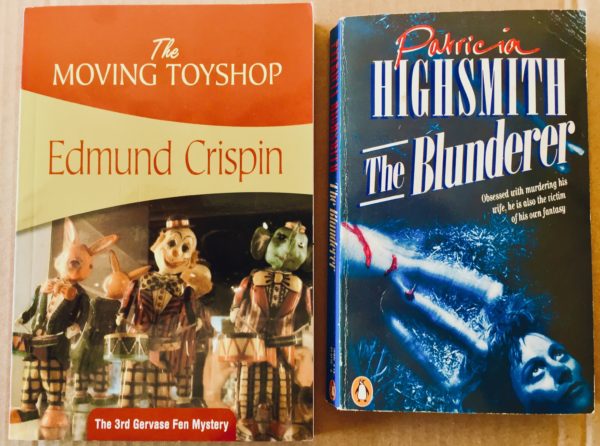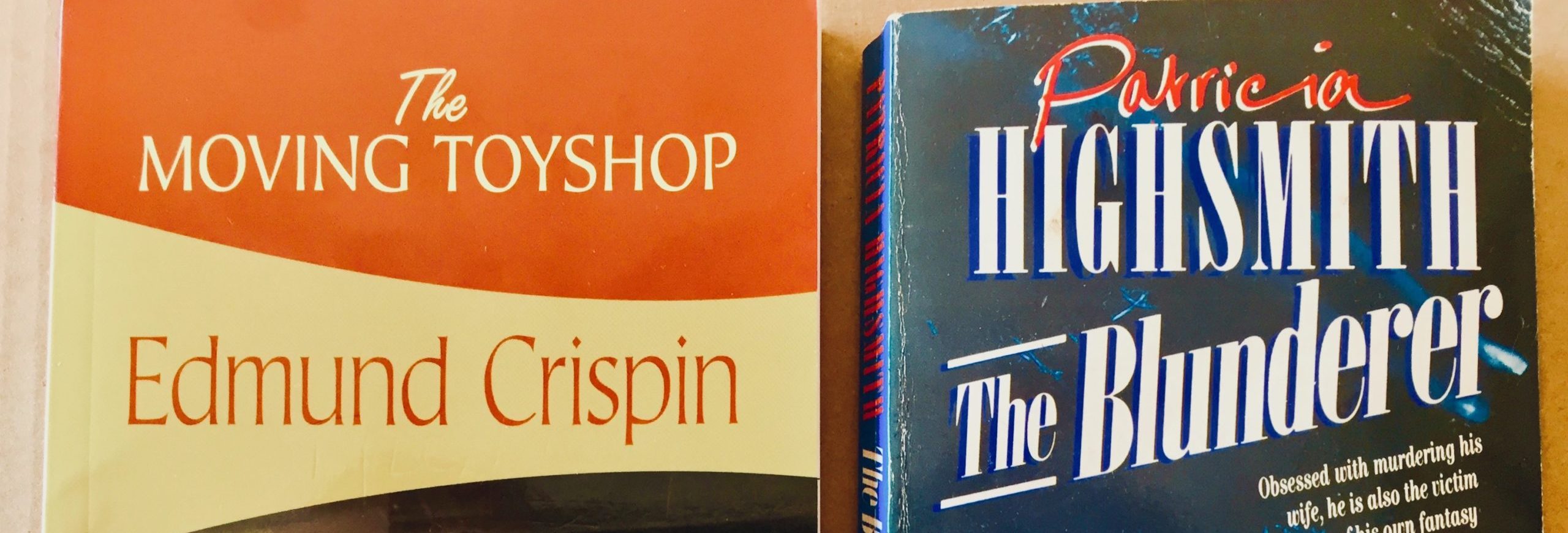Always fun to find half-remembered books. One bonus of this decluttering lark is that you find so many of them.
What to do? Choices:
- Keep: The book has an enduring value. While there is no more room you just have to hold on to this one. It’s either irreplaceable or just a core component of your identity and emotional furniture.
- Chuck: Sad to see it go but – into the discard box with you.
- Re-read: And then decide.
Here are two that fell into that last category:

And in one of the luxurious armchairs sat Richard Cadogan his face wearing the look of a hunted man.
“Well Gervase,” he said in a colorless voice,”it’s a long time since we were undergraduates together.’
“Good God,” said Fen shocked.”You’re Richard Cadogan.
“Yes”.”
“Well, of course you’re very welcome, but you’ve arrived at a very awkward time…”
“You’re as unmannerly as ever.”
Fen perched on the edge of the desk, his face eloquent of pained surprise. “What an extraordinary thing to say. Have I ever said an unkind word –“
“It was you who wrote about the first poems I ever published ‘This is a book everyone can afford to be without.'”
“Ha!” said Fen pleased. “Very pithy I was in those days. Well, how are you my dear fellow?”
“Terrible. Of course you weren’t a professor when I saw you last. The University had more sense.”
“I became a professor,” Fen answered firmly,”because of my tremendous scholarly abilities and my acute and powerful mind.”
“You wrote to me at the time that it was only a matter of pulling a few moth-eaten strings.”
“Oh, did I? said Fen uneasily, “Well never mind all that now. Have you had breakfast?”
“Yes, I had it in hall.”
“Well, have a cigarette, then.”
“Thanks… Gervase, I’ve lost a toyshop.”

If you enjoy repartee like that (and I do, up to point); don’t mind a preposterous plot, and enjoy literary references then you will like The Moving Toyshop.
Written in 1946 and set in 1938 it reeks and creaks like the period piece it is. It’s set in Oxford which – based on its excessively high fictional murder rate – is a city to avoid.
The title comes from Alexander Pope‘s The Rape of the Lock:- a reference that sets a tone for some of the mock heroics of the story:
With varying vanities, from every part,
They shift the moving toyshop of their heart
And it’s dedicated to the poet Phillip Larkin who was the author’s contemporary at Oxford.
Crispin tweaks Larkin when his professor of English and amateur sleuth Gervase Fen mentions an undergraduate essay called “The Influence of Sir Gawain on Arnold’s Empedocles”. Fen comments: “Good heavens, that must be Larkin: the most indefatigable searcher out of pointless correspondences the world has ever known.”
At another moment – during a chase and faced with a choice of direction – Cadogan suggests: “Let’s go left. After all, Gollancz is publishing this book.” (Victor Gollancz was the publisher who pioneered the Left Book Club that started in the 1930’s).
It’s a whodunnit and howdunnit murder mystery and a farcical romp. A corpse – and an entire shop – disappear and the whole thing hinges on a set of limericks. There’s some casual violence and sexism, a nice bit of water boarding in the river, and a dead dog. All very golden-age cosy and classic.
The book ends with a fairground scene rather like carousel sequence at the climax of Alfred Hitchcock’s Strangers on a Train. Both have two men struggling, an attendant who is accidentally shot, and a berserk merry-go-round that is only stopped when someone crawls beneath the spinning machinery to get to the controls.
Here that nightmare sequence via Hitchcock:
Patricia Highsmith wrote that first novel – Strangers on a Train – when she was 29. The Blunderer was her third, and her second thriller – if that is the right word to describe her uniquely compelling fictional forays into a subterranean world of danger and beguiling amorality.

The blunderer of the title is successful New York lawyer Walter Stackhouse who reads a newspaper account of the brutal murder with which the novel opens. And so begins the sequence of blunders that will unravel his apparently charmed life.
Many of Highsmith’s novels have this disturbing and relentless ability to dip below the glaze of a perfect suburban world.
On the surface – the highballs and canapés of the cocktail parties by the pool of the perfect house. Beneath – the eddying currents that threaten to destabilize everything. The Highsmith world is one of moral relativity, obsession, and unstable identity
Strangers on a Train is the story of two men who meet by chance and whose lives become perilously intertwined. The blunderer, too, has his doppleganger. Melchior Kimmel is not the well-heeled professional but a crude sociopath who brutally kills his wife: “He was aware only of pure joy, of a glorious sense of justice…”
It had been years since I first read these two books so the re-reading was easy. I had a clearer recollection of the Crispin and I remembered some of the farcical elements, Fen’s arch eccentricities – Oh my paws and whiskers! – and plot devices. And I can easily do without his bad driving and his car – the Lily Christine III. All too precious. But the literary games Cadogan and Fen play are fun. One is ” Detestable Characters in Fiction” – naming characters that the author intended to be sympathetic. Another is “Unreadable Books in Literature”. Fun stuff for the literary minded and/or tolerant. As is the Chief Constable, whose preoccupation is not crime but debating Shakespeare.
Re-reading The Blunderer was like reading it for the first time. The story moves forward with an inexorable chilling blandness – a familiar and featureless 1950s landscape – that draws the reader into a net that drags its characters down into the depths. I’m a big Highsmith fan.
So – the decision? I enjoyed my second readings. But they can go.



We loved this many years ago, but I read it again recently and was, like you, a bit disappointed
gert 2
Ive always been a sucker for an Oxford Don
Always liked mysteries set inside closed communities like schools and colleges. And the erudite detective is an enduring trope in all the best of them.